Related Research Articles
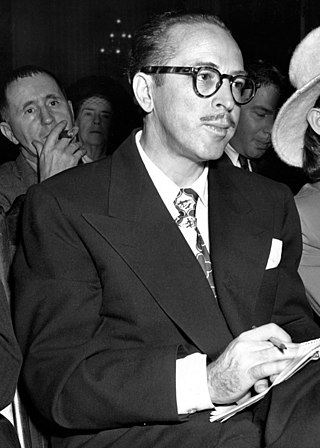
James Dalton Trumbo was an American screenwriter who scripted many award-winning films, including Roman Holiday (1953), Exodus, Spartacus, and Thirty Seconds Over Tokyo (1944). One of the Hollywood Ten, he refused to testify before the House Un-American Activities Committee (HUAC) in 1947 during the committee's investigation of alleged Communist influences in the motion picture industry.
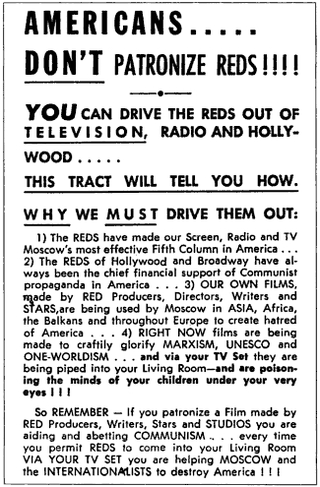
McCarthyism, also known as the second Red Scare, was the political repression and persecution of left-wing individuals and a campaign spreading fear of alleged communist and Soviet influence on American institutions and of Soviet espionage in the United States during the late 1940s through the 1950s. After the mid-1950s, U.S. Senator Joseph McCarthy, who had spearheaded the campaign, gradually lost his public popularity and credibility after several of his accusations were found to be false. The U.S. Supreme Court under Chief Justice Earl Warren made a series of rulings on civil and political rights that overturned several key laws and legislative directives, and helped bring an end to the Second Red Scare. Historians have suggested since the 1980s that as McCarthy's involvement was less central than that of others, a different and more accurate term should be used instead that more accurately conveys the breadth of the phenomenon, and that the term McCarthyism is now outdated. Ellen Schrecker has suggested that Hooverism after FBI Head J. Edgar Hoover is more appropriate.
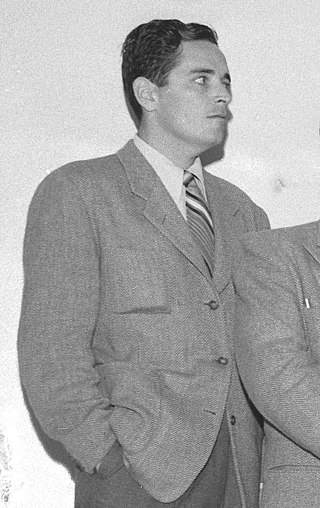
Ringgold Wilmer Lardner Jr. was an American screenwriter. A member of the "Hollywood Ten", he was blacklisted by the Hollywood film studios during the late 1940s and 1950s after his appearance as an "unfriendly" witness before the House Un-American Activities Committee (HUAC) leading to Lardner being found guilty of contempt of Congress.

Joseph Walton Losey III was an American theatre and film director, producer, and screenwriter. Born in Wisconsin, he studied in Germany with Bertolt Brecht and then returned to the United States. Blacklisted by Hollywood in the 1950s, he moved to Europe where he made the remainder of his films, mostly in the United Kingdom. Among the most critically and commercially successful were the films with screenplays by Harold Pinter: The Servant (1963) and The Go-Between (1971).
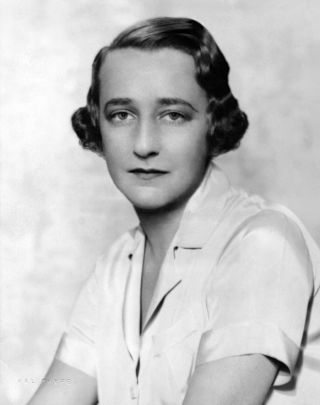
Lillian Florence Hellman was an American playwright, prose writer, memoirist and screenwriter known for her success on Broadway, as well as her communist sympathies and political activism. She was blacklisted after her appearance before the House Committee on Un-American Activities (HUAC) at the height of the anti-communist campaigns of 1947–1952. Although she continued to work on Broadway in the 1950s, her blacklisting by the American film industry caused a drop in her income. Many praised Hellman for refusing to answer questions by HUAC, but others believed, despite her denial, that she had belonged to the Communist Party.

The Front is a 1976 American drama film set against the Hollywood blacklist in the 1950s, when artists, writers, directors, and others were rendered unemployable, having been accused of subversive political activities in support of Communism or of being Communists themselves. It was written by Walter Bernstein, directed by Martin Ritt, and stars Woody Allen, Zero Mostel and Michael Murphy.
Abraham Lincoln Polonsky was an American film director, screenwriter, essayist and novelist. He was nominated for an Academy Award for Best Original Screenplay for Body and Soul but in the early 1950s was blacklisted by the Hollywood movie studios, after refusing to testify at congressional hearings of the House Un-American Activities Committee, in the midst of the McCarthy era.
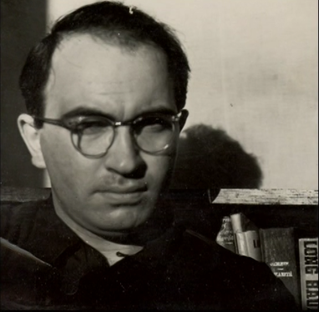
Albert Isaac "Buzz" Bezzerides was an American novelist and screenwriter, best known for writing films noir and action motion pictures, especially several of Warners' "social conscience" films of the 1940s.
Paul Jarrico was an American screenwriter and film producer who was blacklisted by the Hollywood movie studio bosses during the era of McCarthyism.

Carl Foreman, CBE was an American screenwriter and film producer who wrote the award-winning films The Bridge on the River Kwai and High Noon, among others. He was one of the screenwriters who were blacklisted in Hollywood in the 1950s because of their suspected communist sympathy or membership in the Communist Party.
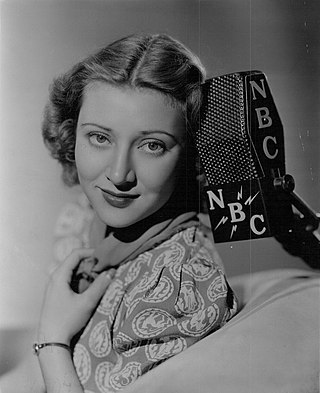
Jean Rouverol was an American author, actress and screenwriter who was blacklisted by the Hollywood movie studios in the 1950s.

Walter Bernstein was an American screenwriter and film producer who was blacklisted by the Hollywood movie studios in the 1950s because of his views on communism. Some of his notable works included The Front (1976), Yanks (1979), and Little Miss Marker (1980). He was a recipient of Writers Guild of America Awards including the Ian McLellan Hunter Award and the Evelyn F. Burkey Award.

Philip Ives Dunne was an American screenwriter, film director and producer, who worked prolifically from 1932 until 1965. He spent the majority of his career at 20th Century Fox. He crafted well regarded romantic and historical dramas, usually adapted from another medium. Dunne was a leading Screen Writers Guild organizer and was politically active during the "Hollywood Blacklist" episode of the 1940s–1950s. He is best known for the films How Green Was My Valley (1941), The Ghost and Mrs. Muir (1947), The Robe (1953) and The Agony and the Ecstasy (1965).
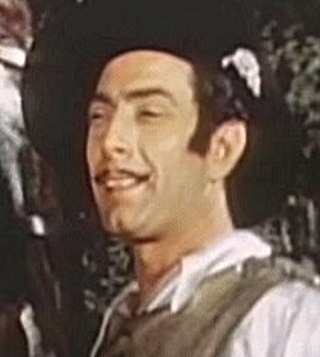
Nedrick Young, also known by the pseudonym Nathan E. Douglas, was an American actor and screenwriter often blacklisted during the 1950s and 1960s for refusing to confirm or deny membership of the Communist Party before the House Committee on Un-American Activities (HCUA). He is credited with writing the screenplay for Jailhouse Rock in 1957, which starred Elvis Presley.

Elizabeth Burbridge was an American screenwriter and actress, best known for her Western screenplays.
Ben Barzman was a Canadian journalist, screenwriter, and novelist, blacklisted during the McCarthy Era and known best for his screenplays for the movies Back to Bataan (1945), El Cid (1961), and The Blue Max (1966).
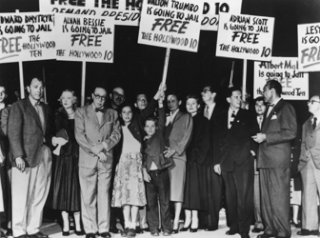
The Hollywood blacklist was an entertainment industry blacklist put in effect in the mid-20th century in the United States during the early years of the Cold War, in Hollywood and elsewhere. Actors, screenwriters, directors, musicians, and other American entertainment professionals were barred from work by the studios.
Marguerite Roberts was an American screenwriter, one of the highest paid in the 1930s. After she and her husband John Sanford refused to testify in 1951 before the House Un-American Activities Committee, she was blacklisted for nine years and unable to get work in Hollywood. She was hired again in 1962 by Columbia Pictures.

Ardel Wray was an American screenwriter and story editor, best known for her work on Val Lewton's classic horror films in the 1940s. Her screenplay credits from that era include I Walked with a Zombie, The Leopard Man and Isle of the Dead.
Edward Huebsch, AKA "Eddie Huebsch" and "Ed Huebsch," (1914-1982) was a 20th-century American Communist screenwriter whose career was cut short by the Hollywood blacklist.
References
- 1 2 Ronald Bergan. "AI Bezzerides". London: The Guardian, February 6, 2007. http://www.guardian.co.uk/news/2007/feb/06/guardianobituaries.obituaries Accessed January 25, 2012.
- ↑ "4 Jun 1953, Page 3 – The Fresno Bee The Republican at Newspapers.com". Newspapers.com. Retrieved December 31, 2018.